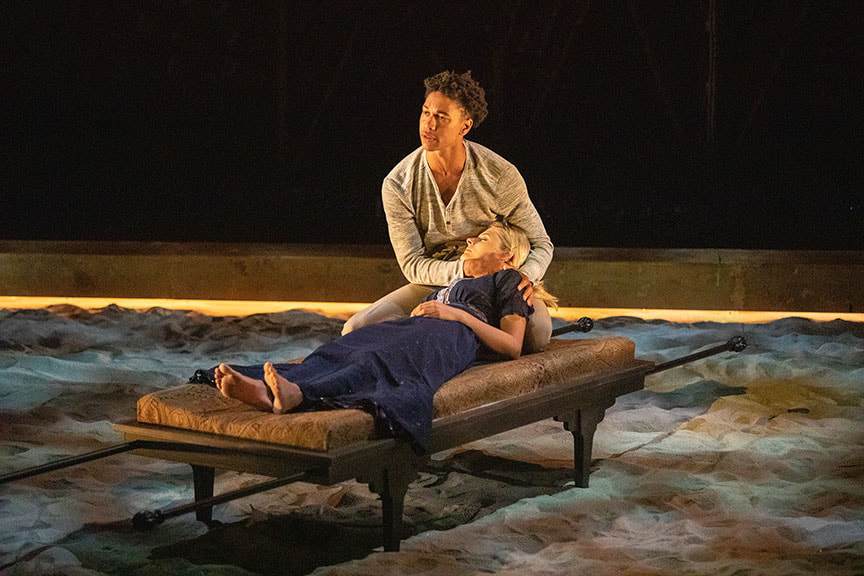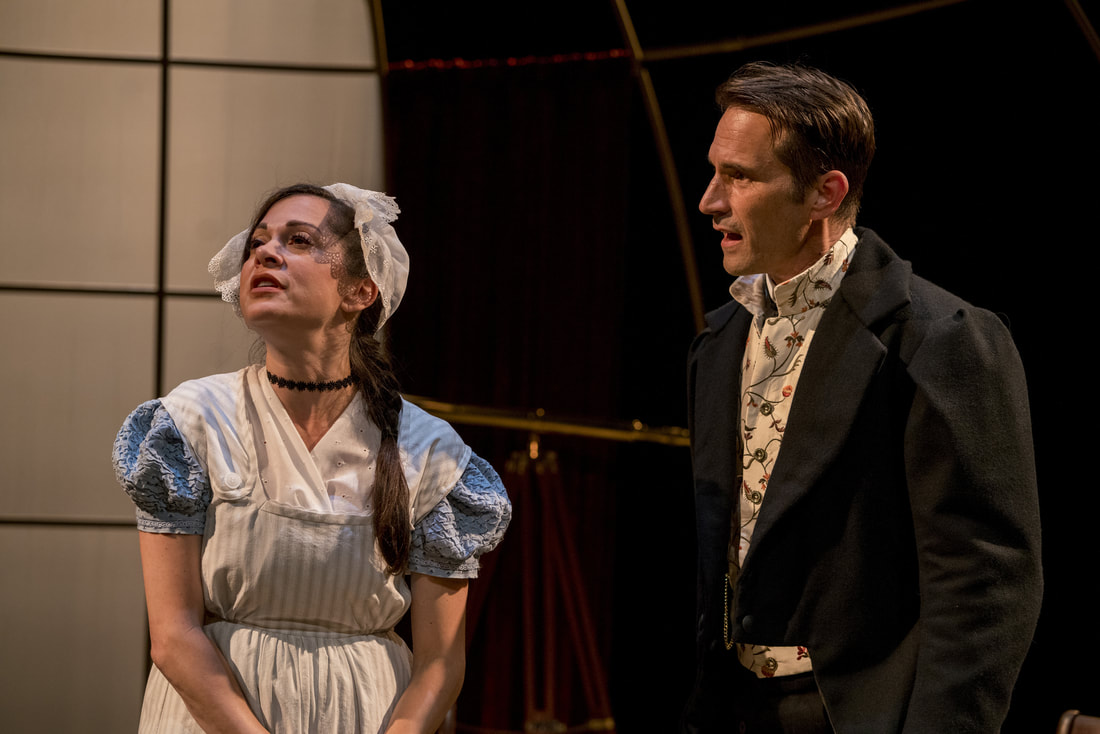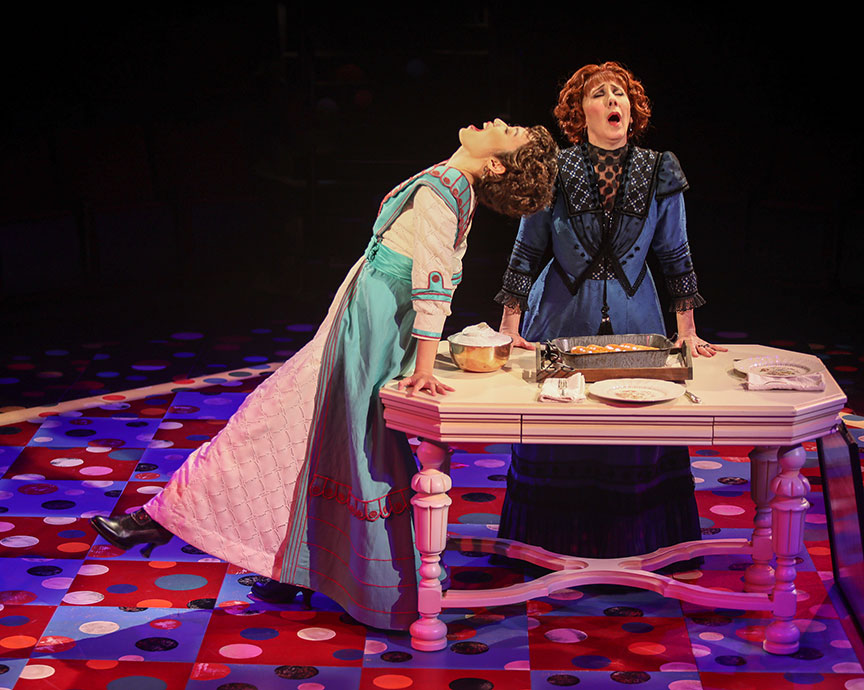|
I’ve ridden the Coast Starlight train from Los Angeles to Seattle and over the 36 hours that are required to make the trip observed that as with most modes of mass travel, strangers don’t talk to each other.
For the most part, they don’t talk to each other either in Keith Bunin’s play The Coast Starlight, a world-premiere production at La Jolla Playhouse that grew out of a commission from the theater and which was workshopped in the Playhouse’s DNA New Work Series. But here’s where Bunin’s ingenuity comes to the fore: throughout the 100 minutes, the characters imagine and even act out what they might have, perhaps should have said to each other. Far more than a cute device, this makes The Coast Starlight an introspective tale about what goes unspoken and what’s left unsaid, and how missed opportunities or moments unseized may leave behind an emptiness. Medic T.J. (Nate Mann) boards the northbound train in L.A. after having deserted his post at Camp Pendleton. He wants no part of a deployment to Afghanistan. On his way to exactly where he isn’t sure, T.J. encounters fellow passengers harboring their own secrets or anguish: Animation artist Jane (Camila Cano-Flavia) is headed for Seattle to rendezvous (or break up) with her long-distance boyfriend. Caustic military veteran Noah (Rhys Coiro) is on his way to be with his ailing mother in Redding, Calif. Noisy and profane Liz (Mia Barron) has left her jerk of a husband after a tell-all weekend at the Esalen retreat and is seeking refuge in Portland. Ed (Rob Yang) is drunk and trying to escape a career of chain hotels and rental cars that’s eating him alive. And Anna (Stephanie Weeks) has just identified the body of her dead, drug-abuser brother. These circumstances are revealed in what-might-have-been scenarios that are reflected through quietly tortured T.J.’s earnestness and good heart. Tyne Rafaeli directs the cast members portraying the passengers on a raised, rotating stage adorned with nothing more than familiar-looking train seats. Like the characters’ understanding of each other’s desperations, any changing scenery of the traveling Coast Starlight or other railway-car props are left to the imagination. The contemplative tone established early in the going when only T.J. and the sweetly curious Jane are onstage lasts only as long as it takes for the brassy Liz character to heighten the volume, followed by the laughs at hapless (and initially hostile) Ed’s expense. Eventually, though, the tenor of The Coast Starlight settles into a pensiveness that challenges us all to consider our choices, on or off a train. (Review originally published in San Diego CityBeat on 8/28/19.)
0 Comments
West Side Story is the greatest of all takes on Romeo and Juliet. Up in Vista, Moonlight Stage Productions’ revival directed by Steven Glaudini is an uncompromising adaptation that does not avoid any of this legendary musical’s darkness. Theirs is a polished yet frank production of a show that stands proudly on the shoulders of its creative giants: Leonard Bernstein (music), Stephen Sondheim (lyrics) and Jerome Robbins (the original director and choreographer).
Michael James Byrne, paired with 18-year-old Bella Gil (as lovestruck Maria), delivers vocals that are tender and deep-seated as equally lovestruck Tony, while Courtney Arango brings all the passion required of Anita, the supporting but equally important female role. The fight scenes are fierce, the dancing exuberant and the aura ominous and foredoomed, just as West Side Story’s streets of New York should be. (Review originally published in San Diego CityBeat on 8/21/19.) Aaron Clifton Moten and Louisa Jacobson in "Romeo and Juliet." Photo by Jim Cox The Old Globe Theatre’s new production of Romeo and Juliet, capping off its Summer Shakespeare Festival, is a youthful and sometimes outrageous take on the immortal love story. Its stage is a giant sandbox, complete with shovel, pail and items buried beneath the surface. Most actors perform in their bare feet. Romeo (Aaron Clifton Moten) and Juliet (Louisa Jacobson) are giddily overcome with love, as teenagers will be. In fact, the whole first act is a romp not for purists: At the masked party, Juliet belts out “Copacabana” like a disco diva. Later, Mercutio (Ben Chase) channels Mick Jagger on “Beast of Burden.” Throughout, Juliet’s nurse (Candy Buckley) goes full brazen sitcom on the proceedings.
Director Barry Edelstein, who imagineered this playfulness, charts a more traditional course in the play’s deadly and heartrending second act. Though even then, a fierce portrayal of Friar Laurence by Jesse J. Perez departs from by-the-numbers stagings of R&J. In integral and revealing junctures, Mark Bennett’s original music and the accompaniments of pianist Justin Gray provide brooding and beautiful atmosphere. Not every bold stroke in this production succeeds. Then again, live theater is for the bold. (Review originally published in San Diego CityBeat on 8/21/19.) Herbert Siguenza is a sheer joy to watch and listen to in his solo show A Weekend with Pablo Picasso. First produced six years ago at the San Diego Rep, where Siguenza is a playwright in residence, the 80-minute piece is now onstage at New Village Arts in Carlsbad, directed as in 2013 by Rep Associate Artistic Director Todd Salovey. While the stage is smaller this time around, the play is just as lively and engaging.
Siguenza portrays Picasso in 1957, residing in France and having just been commissioned to create six new works over the course of one weekend. Siguenza, a talented artist in his own right), actually produces some of them with great flourish during the swiftly paced performance, all the while treating the audience to the insights and delights of the singular master that was Picasso. (Review originally published in San Diego CityBeat on 8/14/19.) Janae Parson (center) in "33 1/3 House of Dreams" at San Diego Rep. Photo by Daren Scott For those with long memories and silvering hair, 33/1/3 House of Dreams is a great big nostalgic hug. For music-heads in general, this world premiere at the San Diego Repertory is a delightful and revealing chronicle of Gold Star Recording Studios, from which Top 40 hits flowed like fine wine. Written by Jonathan Rosenberg and Brad Ross in collaboration with Steve Gunderson and Javier Velasco (who directs), House of Dreams is a docu-musical focused on Gold Star co-founders Stan Ross (Nicholas Nogiardo-Cooper) and Dave Gold (Jacob Caltrider), with cast members portraying, and performing as the case may be, everyone from Phil Spector (Collin Leydon) to Brian Wilson (Joshua Penrod) to Tina Turner (Janae Parson, a showstopper).
The hits (too many to list here) just keep on coming in this show, but House of Dreams isn’t just another churned-out jukebox musical. The odyssey of Stan, the dreamer, and Dave, the technical wizard, may be star studded but it’s a genuinely human one. With a massive cast (including students like Parson from the San Diego School for Creative and Performing Arts), multiple set pieces and costumes, and over 20 musicians, House of Dreams is the Rep at its most ambitious, and with all this talent involved it becomes its own house of dreams. (Review originally published in San Diego CityBeat on 8/14/19.) Jessica John and Francis Gercke in "An Experiment With An Air Pump." Photo by Daren Scott Ruminative and penetrating, British playwright Shelagh Stephenson’s “An Experiment With An Air Pump” is about intersections: The intersection of science and the humanities. The intersection of soul and intellect. The intersection of turns of the century 200 years apart and a dark mystery that binds them.
Prior to the opening of Backyard Renaissance Theatre Company’s staging of “An Experiment With An Air Pump” Saturday night, patrons were encouraged to “sit forward” rather than back to enjoy the production. Sound advice, as it turns out. This is an immersing, edge-of-one’s seat play populated in both its time periods (1799 and 1999) by richly realized characters that inspire strong emotional reactions. Deftly directed by Richard Baird and featuring a superb cast of seven, “An Experiment With An Air Pump” is the most impressive production in the four-year history of Backyard Renaissance, which is the 2018-2019 resident theater company at La Jolla Playhouse. An homage to Tom Stoppard’s time-shifting “Arcadia,” Stephenson’s late-‘90s play was also inspired by a 1768 painting by Joseph Wright of Derby titled “An Experiment on a Bird in the Air Pump.” A copy of the painting on stage in the Playhouse’s Theodore and Adele Shank Theatre comes to dramatic life at the opening of the play, followed by a brief monologue likening those portrayed on the canvas to the inhabitants of a home in Newcastle upon Tyne, England, in 1799. Joseph Fenwick (Robert Smyth) is a fiercely committed scientist and anti-monarchist whose passions no longer extend to wife Susannah (Susan Angelo). Her unhappiness has turned to drink and to verbal barbs within a household occupied by the Fenwick’s excitable daughters (Caroline Keeler and Olivia Cordell), a hunchbacked Scottish maid, Isobel (Jessica John) and two physicians, Roget (Justin Lang) and Armstrong (Francis Gercke). Two hundred years later in the same house, which is under renovation prior to being sold, scientist Ellen (Angelo) has been offered a position doing pre-embryonic research for a fellow geneticist (Keeler). The ethical considerations involved are troubling to Ellen’s English professor spouse (Smyth), who has lost his position but not his convictions. This moral quandary mirrors one debated back in 1799: whether to use bodies robbed from graves to do research. Transcending the 200 years is an untimely death and the discovery at the house of skeletal remains. Hidden in this connection is a heartbreaking subplot manifested in a beautifully poignant performance by John and a terrifying one by Gercke, Backyard Renaissance’s executive director and artistic director, respectively. Smyth, artistic director at Lamb’s Players Theatre, brings presence and gravitas to both his roles, and his interplay with Angelo, especially in a fervent confrontation over Fenwick’s and Susannah’s fractured relationship, is absorbing. “An Experiment With An Air Pump” is fairly bulging with questions of ethical principles, gender roles and what best informs inquiry of a universe that confounds men and women across the expanse of time. Yet with all these ponderous and paramount questions at the fore, it echoes in this compelling production the sometimes-uneasy beat of the human heart. (Review originally published in The San Diego Union-Tribune on 8/13/19.) Regina De Vera (left) and Joanna Glushak in "The Underpants." Photo by Jim Cox The Underpants of Steve Martin’s 2002 adaptation of Carl Sternheim’s farce Die Hose belong to Louise Maske, a German housewife in the early 20th century who inadvertently drops her unmentionables in public with the result of turning on a couple of prospective renters of the room she and her husband Theo are letting. One is a dashing poet, Versati, who can’t get out of the way of his own swooning verbiage; the other is Cohen, a rank hypochondriac. In the noisy, 90-minute romp inside the Old Globe’s intimate White Theatre, Versati (Luis Vega) and Cohen (Michael Bradley Cohen) make their plays for Louise (Regina De Vera) while the unsuspecting Theo (Eddie Kaye Thomas) goes about his chauvinistic business.
I didn’t find The Underpants all that funny the first time I saw it, seven years ago at the North Coast Rep in Solana Beach, nor do I find it that funny today. Its shouting and pratfalling come off like a more risqué sketch from “The Carol Burnett Show,” with everyone acting out in glorious costume and full throat. Cohen (as Cohen) does it best of anyone in the cast, which also includes Joanna Glushak as the flushed and horny neighbor Gertrude, and Jeff Blumenkrantz and Kris Zarif in more minor roles. Tossing the Maskes’ house cats (and kicking one) is played for laughs, as is the repeated, uncomfortable bit of renter Cohen pretending not to be Jewish. The Martin strategy seems to be if something works once, why not work it again? And again? Say this for the Old Globe production directed by Walter Bobbie: It employs some canny stage effects. The cats, they who eventually go flying, are animated with lifelike movements such as flopping tails. Recorded snippets of music, whether to evoke Wagner or to set the mood for a sexy seduction, accompany the action. An animatronic bird in a cage (an unsubtle metaphor for Louise perhaps?) suspended from above does everything but shed feathers. This play has deep connections to the Old Globe. Die Hose was introduced to Martin by now-Globe Artistic Director Barry Edelstein, who also directed the world premiere of The Underpants in New York 17 years ago. Its run (through Sept. 8) in Balboa Park this summer is likely to be a busy and well-attended one. (Review originally published in San Diego CityBeat on 8/7/19.) The stage musical “All Shook Up” has something very much in common with one of those by-the-numbers Elvis Presley “teen movies” from the mid-to-late 1960s: a sanitation of the Elvis rebel spirit. There’s nothing remotely dangerous about either, nothing overtly heated or sexual. The Elvis of films like “Tickle Me” is a good-looking but eminently good guy. The folks in “All Shook Up” who sing 26 tunes made popular by Presley, including the Elvis-evoking Chad (referred to throughout as “The Roustabout”), are shiny, happy people.
The qualitative difference between one of those old Elvis flicks and “All Shook Up,” which opened Saturday on San Diego Musical Theatre’s Gaslamp Quarter stage, is the music. The 2004 jukebox musical is bursting with Elvis hits. To name just a few: “Heartbreak Hotel,” “Teddy Bear,” “Hound Dog,” “Love Me Tender,” “Blue Suede Shoes,” “Don’t Be Cruel,” “All Shook Up,” “Jailhouse Rock” (which opens the show) and “Can’t Help Falling in Love,” the most beautifully adapted number among the more than two dozen included. Joe DiPietro (“Memphis”) wrote the book for “All Shook Up,” which weaves these Elvis songs through a benign but likable story about what happens to the denizens of a small midwestern town one summer in the mid-’50s when a motorcycle-riding stranger (Jesse Bradley, the aforementioned Chad) drifts into their midst. At the time, everyone’s under the oppressive thumb of the “Mamie Eisenhower Decency Act,” which expressly prohibits “loud music, public necking and tight pants.” DiPietro’s master stroke was enhancing what might have been a pedestrian premise with a gambit right out of one of Shakespeare’s masked romantic comedies. When smitten Natalie Haller (Krista Feallock) gets nowhere with Chad, who has pop eyes for the sensuous town museum curator Miss Sandra (Sami Nye), she disguises herself as “Ed,” and becomes Chad’s fraternal sidekick. Heavens to “As You Like It”! Further mining The Bard, almost everybody in this town is in love with somebody elusive or unlikely. Or, by story’s end, he or she discovers a truer love right under his or her nose. Most of the Presley tunes employed fit snugly into the storytelling. A few others function as little more than transitional punch lines. Still, an Elvis hit is an Elvis hit. “All Shook Up,” directed at SDMT by Robert J. Townsend, is not explicitly about Presley, but even with all the Shakespeare-like machinations, his presence looms. Bradley and Feallock are pleasing leads, though the latter’s male disguise is undermined by a clumsy, distractingly odd hat. Erin Vanderhyde as proprietor of Sylvia’s Honky-Tonk renders a knockout “There’s Always Me,” and Brooke Henderson, playing her daughter Lorraine who is one-half of a charming interracial romance, possesses a voice so sweet it’s a shame she doesn’t get a solo of her own. The choreography by Michael Mizerany is exuberant, maximizing every square foot of the Horton Grand Theatre stage. It’s a reminder that so many of Elvis Presley’s beloved hits were made for dancing, even if you’ve never swiveled a hip in your life. (Review originally published in The San Diego Union-Tribune on 8/5/19.) |
AuthorDavid L. Coddon is a Southern California theater critic. Archives
July 2024
Categories |
David Coddon |
|



